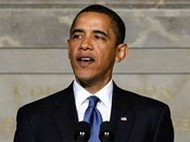It Is Expected that Obama Will Extend Trade Embargo with Cuba
- Submitted by: admin
- Politics and Government
- 09 / 03 / 2009

On Sept. 14, the law used to impose the U.S. trade embargo on Cuba will expire unless President Barack Obama signs an extension. Embargo supporters need not worry, however.
But the fact that Amnesty International on Monday urged Obama to let TWTEA expire underlined the legal maneuvering underway as opponents and supporters of the embargo strategize over the best way to undermine or preserve the U.S. sanctions against the island.
Allowing TWTEA to expire would be ``a gesture without meaning,'' said Washington attorney Robert Muse, considered a top expert on the history and legal structure of the embargo. Adopted in 1917, TWTEA for many years was applied to ``enemy countries'' after a formal U.S. declaration of war, Muse said. In 1963. President John F. Kennedy used TWTEA against Cuba under a declaration of an ``international emergency.''
But in the 1970s, TWTEA was replaced by the International Emergency Economic Powers Act. No new sanctions could be imposed under TWTEA, Muse added, but Cuba was grandfathered in. The 1996 Helms-Burton measure essentially turned the embargo into law and set conditions for lifting it that amount to having a democratically elected Cuban government.
The Miami Herald
Source: Miami Herald
But the fact that Amnesty International on Monday urged Obama to let TWTEA expire underlined the legal maneuvering underway as opponents and supporters of the embargo strategize over the best way to undermine or preserve the U.S. sanctions against the island.
Allowing TWTEA to expire would be ``a gesture without meaning,'' said Washington attorney Robert Muse, considered a top expert on the history and legal structure of the embargo. Adopted in 1917, TWTEA for many years was applied to ``enemy countries'' after a formal U.S. declaration of war, Muse said. In 1963. President John F. Kennedy used TWTEA against Cuba under a declaration of an ``international emergency.''
But in the 1970s, TWTEA was replaced by the International Emergency Economic Powers Act. No new sanctions could be imposed under TWTEA, Muse added, but Cuba was grandfathered in. The 1996 Helms-Burton measure essentially turned the embargo into law and set conditions for lifting it that amount to having a democratically elected Cuban government.
The Miami Herald
Source: Miami Herald
Comments